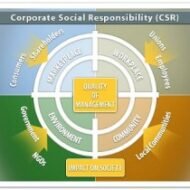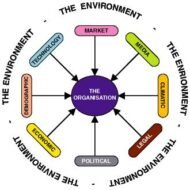Posted by Managementguru in Business Ethics, Business Management, CSR, Economics, Organisational behaviour, Principles of Management
on Mar 15th, 2014 | 0 comments

CSR – An Image or Ethos A company’s sense of responsibility towards the community and environment in which it functions is known as corporate social responsibility.The object of social responsibilities of business has become the hot topic for discussion. Let’s not forget that really big companies are into the process of service benefiting economically backward population. It is widely accepted that accountability to owners is too narrow a concept for today’s business and that there is no reason why owner’s interests should take precedence over the interest of other claimants-employees, consumer community and the society at large. Responsibilies of Business Concerns: There is no definition of the concept of social responsibility which is valid for all business concerns and for all times. This is because responsibilities of business should be related to the changing societal expectations, which is dependent upon the social, cultural, political and other environmental forces, which are dynamic too. Business responsibility to the society goes beyond simply assuming the profit-making role. It implies that the management has to protect and improve the welfare of the society as a whole along with its own interest. What is the primary objective of a business? One common misunderstanding about the concept of social responsibility has to be clarified here. It does not challenge the primary objectives of business. It does not say that “to make profit is to sin.”Profiteering is different from profit making. Selfish interest is different from self-interest. Social responsibility is against profiteering and selfish business behavior. But profit making and self interest should be the basic elements of corporate responsibilities. Economic concerns and social concerns need not be viewed as opposite ends. They are complementary to each other. They are consistent with one another. Thus the nature and content of business responsibilities depend upon societal expectations placed on organizations which include invariably the economic performances and legal obligations, and go beyond them. How far it goes beyond depends on the economic, social and political environment in which the business and society operates. Arguments against social responsibility: The arguments against social responsibility are based on the belief that the society assigns a strictly economic role to the organizations and the concept dilutes the primary purpose of the business. Business should mind its business and business persons don’t have the right attitude to serve the society. Let it be the responsibility of government and social service organizations. Business has already enough economic and social power and no more concentration of power is necessary to business circles. Service to society is undoubtedly an important objective of business. It can render service to society by providing quality goods and services to the community; it can provide adequate opportunities to the members of the society; provide goods and services at reasonable price. Another important aspect would be to ensure control of pollution towards air, water and soil. Showing concern for the well -being of other constituencies of the society is a good gesture that helps the business to earn goodwill and support of the society as a...

Posted by Managementguru in Business Management, Principles of Management
on Feb 26th, 2014 | 0 comments

Factors of External Environment of Business What do you mean by Business Environment: The sum total of all things external to firms and industries that affect the functioning of the organization is called Business Environment. Elements of Business Environment 1. ECONOMIC 2. SOCIAL 3. CULTURAL 4. POLITICAL 5. LEGAL 6. TECHNOLOGICAL 7. DEMOGRAPHIC 8. GEOGRAPHICAL 9. ECOLOGICAL 1. Economic Environment This refers to all economic factors that influence and affects the very survival of an organization. Can be classified into · Economic factors affecting demand · Competitive forces Economic factors affecting demand The existence of an organization depends on the demand for its products or services. The customers’ ability to buy and willingness to pay determine the demand factor. The buying power is determined again by · Employment · Income taxes · Saving and · Prices The money acquired by an individual through employment is utilized for paying taxes which is the first priority and then comes saving or spending. In developing countries like India, much importance is attached to the habit of saving in the form of insurance policies or mutual fund deposits or investment on immovable assets. This makes the economy strong and stable even during times of recession, whereas we witness the economy of some developed countries entirely shaken when there is an economic depression. Sub Prime Lending Sub prime lending may prove to be disastrous for a growing or grown nation when the money is lent by the banks to third parties without proper securities or collaterals. While the initiative is intended to increase the growth rate or GDP, the end result may not live up to the expectations when the money is parted to individuals or firms with poor financial credentials. Disposable Income Disposable income also decreases when the tax rate increases and his/her ability to buy is reduced. Equally important is the willingness to by because the fact that an individual has the ability does not mean that he or she will buy. Willingness is affected by the preferences for products and the expectation about future factors like the price fluctuation, increase in one’s own income, general economic trend and so on. Competitive forces Firms have to first survive in order to succeed in the market. To accomplish this they exert competitive force on each other through one or the other following methods. · Price cutting · Promotion-advertising, personal selling · Design, feature and packing · Number and type of customer services offered give a cutting edge to firms competing in the race. 2. Social and Cultural Environment The social environment depends upon the · The class structure · Mobility · Nature of the social organization and · Development of social institutions People always have the unending desire to move from one occupational category to another and this is the main reason for high job turn over in IT industries for various reasons like pay, promotions, job satisfaction etc., This is the same reason which can be attributed to the failure of many good projects that go underway due to lack of continuation of the same initiative with which it was started. The above said process is more prevalent in urban societies than rural where scope of mobility is much the less among farmers, artisans and those engaged in traditional crafts and cottage industries. 3. Political Environment A smart manager has to be on tenter hooks to gauge the trends in political scenario that directly or indirectly affect the functioning of the firm. The political weather is highly unpredictable and may be classified into · Long-term changes · Quick changes · Cyclical changes · Regional changes Now-a-days we see that the economic depression in...




